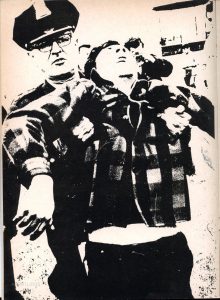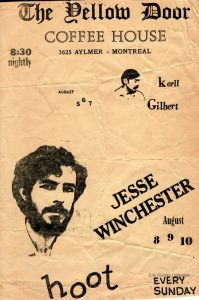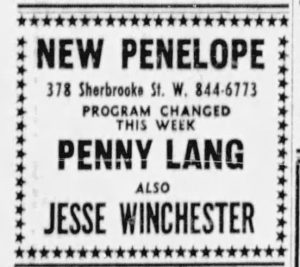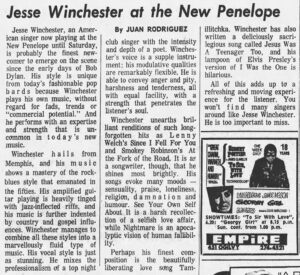Jesse Winchester, An American Expat at The New Penelope
In response to the Vietnam War, in the mid 1960s, the American government increased the number of young people drafted into the Armed Forces. This prompted resistance from many pro-peace young Americans. Some moved to Canada to avoid the draft.
Listen to Gary’s friend, Richard King, talk about attending such a protest, in Montreal, at that time:
Listen to the audio clip with transcript: “Anti-war protest in Montreal”.
Joseph Glazner, a former U.S. draft-dodger who was involved in Logos magazine (and formerly Jesse Winchester’s neighbour), describes his arrival in Montreal, in the 1960s:
Listen to the audio clip with transcript: “Joseph Glazner and his experience as a U.S. draft-dodger, in Montreal”.
This wave of American draft-dodgers brought with it several artists and musicians. They found a second home, in the vibrant Montreal coffeehouses, where they could make a living performing. This also placed them in a community of people with similar interests and lifestyles. Additionally, many of the coffeehouses were anglophone. This facilitated the immigration of English-speaking Americans to mainly French-speaking Quebec.
These young people expanded the Montreal cultural scene with their American musical influences, promoting the locals’ exposure to new music. Listen to Paul Kirby, founding editor of Logos magazine, testify to the role of American deserters in the Montreal counterculture scene, and especially to their involvement in Logos magazine:
Listen to the audio clip with transcript: “Paul Kirby on U.S. draft-dodgers and Logos magazine”.
The New Penelope and its previous incarnations provided the stage for many of these expatriate musicians. The best known of these was Jesse Winchester, who arrived in Montreal in 1967. Gary Eisenkraft was quick to recognize his talent, at an audition, at The New Penelope on Sherbrooke Street. Without hesitation, he told Jesse that he could be the opening act of any show he wanted.
Hear Allan Youster, former doorman of The New Penelope on Sherbrooke Street, describe the infamous first Jesse Winchester audition:
Listen to the audio clip with transcript: “Jesse Winchester auditions”.
The other house band at the Penelope was Jesse Winchester. I was lucky to be there. He comes in with his guitar case. Gary’s there. It was an audition. He gets up on stage, he has his nice white Fender reverb amp. He does Yankee Lady, Black Dog, and I forget the third song. Gary says to him, “Anytime nobody’s playing here, you’re playing here. Anytime somebody’s playing here, you’re opening.” (…) Everytime he played there he did another new song he wrote. He was just amazing, so he was always the opening act.
― Allan Youster, former The New Penelope doorman (interview with ARCMTL, July 2015)
Like many American expats, Jesse lived in Montreal for several years. During that time he recorded albums in Montreal and Toronto. If he was unknown in 1967, three years of playing at Montreal’s folk clubs and at The New Penelope significantly increased his visibility. By the time he returned to the United States in the 1970s, he was a well-known musician.
We used to have Jesse Winchester there, playing between sets for five bucks a night, and it turns out we’re born on the same day, but we will often celebrate our birthdays at the Swiss Hut.
― Mike Bunting, The New Penelope fan and former employee (interview with ARCMTL, April 30, 2021)
Jesse Winchester, an American singer now playing at the New Penelope until Saturday, is probably the finest newcomer to emerge on the scene since the early days of Bob Dylan.
― Juan Rodriguez, “Jesse Winchester at The New Penelope,” The Gazette, July 24, 1968
It is clear that the Vietnam War benefited Montreal, by bringing in so many talented young people. Their own professional development also benefited from their involvement in Montreal’s colourful scene in Montreal.





